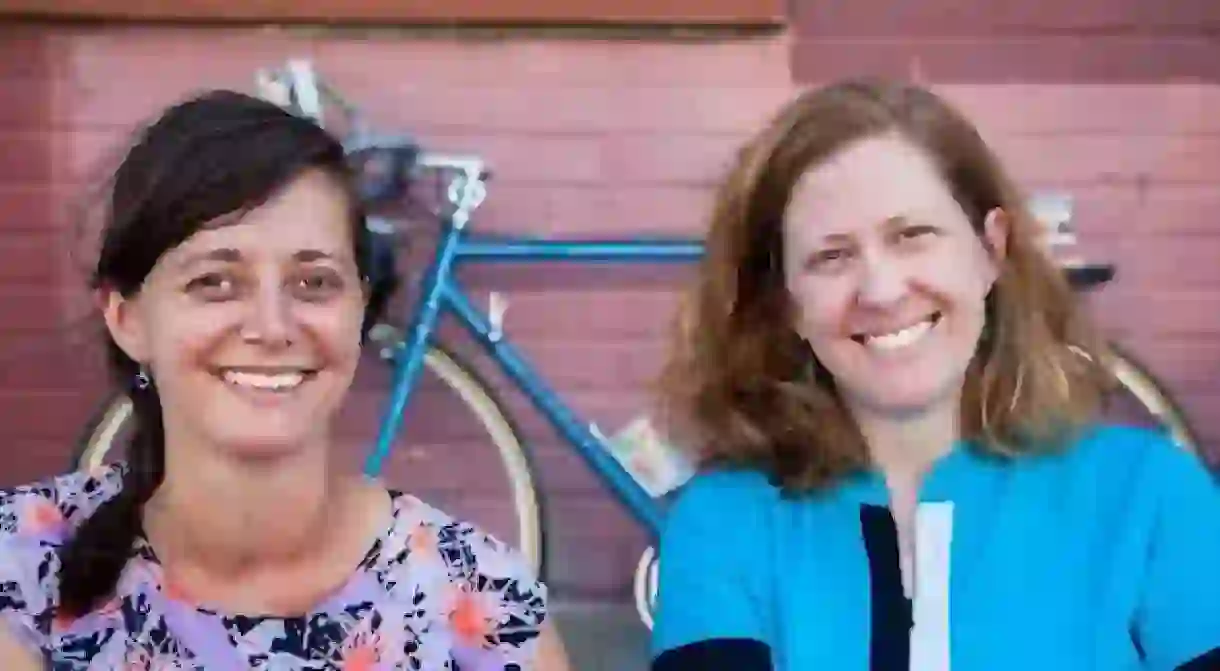Find Your Feminism Through Feminist Library On Wheels

With its many factions and expanding complexities, the road to feminism can be difficult to follow. Luckily for the citizens of Los Angeles, the Feminist Library on Wheels (F.L.O.W.) is ready to help you find your way. With their tricycle of books, witty name and rapidly growing popularity inside and out of L.A., the ladies of F.L.O.W. have become increasingly difficult to avoid. And this is great thing!

‘A collective door-to-door effort to spread the message of feminism is needed for the movement to begin anew…’ No one could have known those words from Bell Hooks’ Feminism is for Everyone would lead to a near literal interpretation of the idea just over a decade after its initial publication. During a Women’s Center for Creative Works reading group in 2014, Jenn Witte, co-founder and witty name provider of F.L.O.W., excitedly suggested an iteration of ‘door-to-door feminism’ to the group: ‘What if I did it on my bike?’ Dawn Finley, F.L.O.W. co-founder, academic refugee and reading facilitator, immediately jumped into logistics. Months later, the duo launched a successful Indiegogo campaign, commissioned a custom tricycle from PedalPositive’s Joe Crennen, collected an admirable selection of feminist texts exclusively through donations, and were ready to take feminism to the streets — on wheels.

‘If this were my private feminist library, more than half the books would be out the door,’ says Finley laughing. Instead of limiting the library’s catalog to the founders’ personal definitions of feminism, F.L.O.W.’s collection is fully inclusive. Finley and Witte relish F.L.O.W.’s expansive collection of contradictory texts such as Germaine Greer’s The Whole Woman — in which she disparages transgender women — and trans-inclusive work Gender Outlaws by Kate Bronstein and Susan Stryker’s Transgender History. As a ‘donations only’ space, the library grows naturally, and sometimes also houses books that are not transparently feminist to the casual observer — like the DIY volumes on cottages and home repairs. Finley explains, ‘There are plenty of DIY traditions in different strands of feminism, like radical separatist feminists who built their own communities and third-wave feminists who made their own ‘zines and their own music. There’s a tradition there.’

After a successful start, F.L.O.W. is looking to expand. Inspired by community activists Ovarian Psycos’ work with LA River High School, Witte’s next goal is to bring feminism to elementary school children with a selection of picture books. And, in an effort to reach more Spanish speaking denizens, Finley wants to lessen the disparity between F.L.O.W.’s Spanish and English texts. They also want to expand their fleet of trikes to increase feminist visibility and accessibility throughout the city.

Courtesy of the Internet and social media especially, feminist issues are being discussed and contemplated publicly more than ever before. Though, Witte agrees, it is difficult to track the movement in its decentralized state: ‘It’s difficult to see which direction new feminism is taking, because [it] comes down to personal exposure.’ Witte says she experiences a lot of positive support in her immediate social circle, on and offline. But it only takes one click to be reminded of the opposition’s vigor, from anti-Planned Parenthood campaigns to strings of anti-feminist article comments. However, she perceives genuine progress: ‘For example, unlike my childhood, thanks to the internet, someone living in that same small town in Idaho could actually discover us and seek [knowledge through] F.L.O.W.’

Meanwhile, Finley recounts obstacles. Honing in on recent events, Finley mentions her disappointment after seeing the trailer for Suffragette, a film about the British women’s movement for equality and the right to vote. To Finley, the film is a Trojan horse, continuing the dominance of white narratives in mainstream feminism. Though hardened by the seemingly endless battle, Finely is not entirely without optimism: ‘I hope keeping these conversations about representations and about activism alive will help break down some of those normative views about what feminism is and what it can do. I hope that more people can do more together.’
To keep current with the Feminist Library on Wheels, check out their website, follow them on Facebook, Instagram, Twitter or email them directly to join the mailing list.
F.L.O.W, P.O. Box 292464 Los Angeles, CA, USA
WCCW, 2425 Glover Pl, Los Angeles, CA, USA
By Vernon X. Odemns
Vernon X. Odemns is a writer, director, photographer, future philanthropist, and potential detective currently residing in LA.
Website: vernonxodemns.com
IG: @vernon_xo













